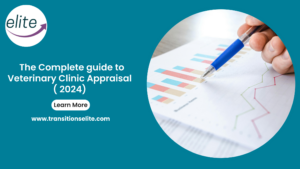How to Calculate Valuation of a Vet Practice( In 2024)

What is Veterinary Practice Valuation?
Veterinary practice valuation is the professional assessment of a veterinary clinic’s financial worth, considering factors such as financial performance, assets, liabilities, and market trends to determine a fair and accurate value.
How Much Do Veterinary Practices Sell For?
Veterinary practices typically sell for 8 to 13 times their EBITDA (Earnings Before Interest, Taxes, Depreciation, and Amortization). Factors influencing the sale price include the practice’s size, location, profitability, growth potential, and quality of the client base.
To maximize the value of a veterinary practice, focus on enhancing profitability, improving operational efficiency, and demonstrating strong growth potential.
How Valuation Multiples Determine the Value of a Veterinary Clinic
Veterinary Practice Valuation multiples is crucial for assessing the market value of a veterinary clinic. The most commonly used multiples are:
- Revenue Multiples: Typically ranging from 1 to 2 times the clinic’s annual revenue.
- EBITDA Multiples: Generally between 8 to 13 times EBITDA, depending on various factors including the clinic’s operational efficiency and market conditions.
These financial ratios are essential for comparing a clinic’s value with that of similar establishments in the industry, providing a benchmark for what might be considered a fair market value.
Regional Insights
We know that vet practices are different in each place, so we’re talking about how to value them no matter where you are in North America. Whether you’re in a big city in California or Ohio, the beautiful areas of Colorado, or busy places like New York and Florida, we’ve got tips that work for everyone
If you’re in Arizona, Maryland, New Jersey, Washington, Georgia, Illinois, or even in big cities in Texas like Houston, Dallas, and Austin, this article is for you too. We want to help everyone in the USA and Canada understand their vet practice’s value, whether they’re in a small town or a big city.
With this regional understanding, let’s delve into the key factors influencing vet practice valuation. Hear from our clients who’ve navigated this journey with us. Get to know Dr. Sharon Gorman, Dr. David Graeff and Dr. Lonnie & Naomi Davis who have experienced the incredible benefits of partnering with Transitions Elite when it comes to practice valuation and selling. Discover why understanding the true value of your practice is crucial and why Transitions Elite is the best choice when looking to sell.
“I had previously looked at selling the practice on my own, and I had talked to five different companies about this and had gone through the process individually, and none of it turned out to my satisfaction. After I signed up with Tom, he marketed me to these interested companies. There was competition amongst those interested. It was so relieving at the end of it to know that I got the very best deal possible!”
David Graeff, Cedar Rapids, Iowa
I knew that I would get the best value for my practice if I had a professional helping me. And it definitely turned out to be true that having Tom in my corner.
I have zero doubt that I would not have gotten the value for my practice if I didn’t have him on my side as well as the ease of it. It was such an easy transition and he made the entire process very simple.
Sharon Gorman – Las Vegas, Nevada
Transitions Elite holds your hand and guides you through the whole process. Even though it’s a stressful time and situation, they make selling so easy.
Dr. Lonnie & Naomi Davis – Ohio
Don’t miss out on your chance to discover the true worth of your practice. Click here to request a free valuation.
Now that we’ve gained some insight from our satisfied clients, let’s dive deeper into the various factors that contribute to veterinary practice valuation and how to maximize the value of your practice before selling. In this article, we will cover:
-
-
How Much is Your Veterinary Practice Worth?
-
How to Value Your Veterinary Practice ?
-
-
- The Factors That Affect Practice Valuation.
-
- How To Calculate The Value Of Your Veterinary Practice.
Before we delve further into this discussion, here is a limited-time opportunity for practice owners to understand the true value of their practice
With a comprehensive understanding of these topics, you’ll be better prepared to know your practice’s worth and make informed decisions when it’s time to sell.
How Much Is Your Veterinary Practice worth?
You have probably asked yourself, ‘How much is my vet practice worth?” or even thought, “How much do veterinary clinics sell for ?“. Whether you are looking for valuation of your veterinary practice or just trying to understand the capitalization rate in the veterinary sector, or seeking insights on veterinary financial benchmarks, this blog will help you in answering these questions and guide you through the evaluation process.
As a veterinarian, you have worked hard to build your vet practice. You have invested in equipment, hired and trained staff, and established a name for yourself among clients. Now it’s time to think about how your practice will be valued when you decide to sell your veterinary practice.
How to Value Your Veterinary Practice ? – Overview
When you put a price on a veterinary practice, there are three standout valuation methods often used by appraisers, both of which share a common factor: emphasis on the practice’s earning or profitability.
What are they? We will get to that later.
We would like to use a minute to clear the air on some vital notions in the sales process.
Profitability Of A Veterinary Practice
Most veterinarians will tell you that their practice is making money. And in a sense, they may be right. As most vet doctors rarely do accounting, they merely assume that since they see pets, check boxes, pay bills and work hard, they must be profitable. In other words, don’t mistake profitability for income.
From an appraiser’s standpoint, the “profitability” of a veterinary practice is determined by subtracting all the expenses like rent and wages from a practice’s revenue. And the more cash a practice generates, the more valuable it will be.
Veterinary Practice Valuation: Tangible Assets And Intangible Assets
When you want to sell a veterinary practice, you have two options. You can sell as an asset sale-i.e, you sell the assets and liabilities of the practice, or you can sell the stock in the case of a corporation ( stock/entity sale). The stock represents the corporation’s equity and is equivalent to the assets of the practice minus its liabilities. The stock represents the equity of your practice exempting liabilities, unlike an asset sale.
Whether an asset or stock sales, the value of a veterinary practice is made up of two types of assets: tangible and intangible.
Tangible Assets: Tangible assets are items that can be physically touched, estimated, or possessed. For vet practice, tangible assets include things like: equipment, inventory, supplies, and the likes. You can determine your practice’s value by totaling its assets’ fair market value and subtracting any liabilities.
Intangible Assets: These are the intangibles that contribute to the value of a vet practice and cannot be easily appraised. They include goodwill, business reputation, your practice location, the value of your clients, and patents. Determining intangible assets’ value is vital because they can amount to a lot- sometimes up to 85% or even more of the practice value.
Vet Practice Worth – Overview
The simple answer is that there is no single way to determine what someone will pay for a veterinary practice. To get to the heart of your practice’s value, you have to peel back several layers of factors:
-
- The size and location of your practice – Is it in a desirable area? Is there room for growth?
-
- Practice reputation – What are people saying about your services offline and online? Are they happy with their experience?
-
- Specialization- Generally, small animal veterinary practice tends to be of more than others owing to sheer number of pet owners in the U.S.
-
- The assets – What kind of equipment does your practice have? Does it need updating or replacement?
-
- The staff – Do you have a good team working for you? If so, great! But if not, then this can be an important factor as well.
Next, we would discuss whether it’s worthwhile to go through all the trouble that goes into estimating the value of your veterinary practice.
Why Do You Need To Value Your Veterinary Practice?
Simple: to protect yourself. To avoid losing money on the deal when you plan to sell. How else can you get paid what your business is worth if you are selling?
That’s not all.
Other reasons for a veterinary practice valuation include:
-
- Help you decide if additional investment in the business would be worthwhile.
-
- To get a loan. When you apply for a bank loan or other financing, they will want to know how much money they can lend on the value of your business.
-
- Partnership insurance: If you have partners in your business, having a valuation done will help protect them if one practice owner wants out or retires. This is especially true if owners had no written agreement before opening the practice together.
Veterinary Practice Valuation Methods
There are many ways to valuate a veterinary practice. Some methods are more appropriate for certain situations than others. The three main methods for valuing a veterinary practice are:
-
- Market Approach
- Asset Approach
- Income Approach
Market Approach To Veterinary Practice Valuation
The market approach is based on the comparable sales of similar businesses in the area where your practice is located.
Keep the following in mind:
-
- The market approach is easy but the least accurate method of valuation.
-
- This method is best suited for situations where much sales data is available within the same market area or region.
-
- The market approach can also be used as a starting point of other valuation methods by identifying how much other similar practices are selling for and considering any differences between those practices and your own.
Asset Approach To Veterinary Practice Valuation
The asset approach uses the fair market value of all assets, including tangible assets like goodwill, at the time of sale as the basis for value.
Some of the selling points of this method include:
-
- It’s simple and requires less information than other approaches.
-
- It is relatively easy to understand and use.
-
- It provides a clear benchmark for buyers and sellers alike by allowing both sides.
-
- It can account for any non-cash assets that may be part of the deal.
Income Approach To Veterinary Practice Valuation
The income approach uses historical financial statements, projections of future earnings, and other information to estimate future cash flows from which an intrinsic value is derived.
The approach assumes that the buyer will pay a price they anticipate would be fair. This is determined by the size of the anticipated financial returns, growth potential, and risk of return.
The problem with using this method is that it requires detailed financial information from at least three years to calculate an accurate estimate of future cash flows. This makes it difficult to estimate values for those practices without audited financial statements.
Vet Practice Valuation Calculator
Find below an example of how to use valuation multiples to calculate the value of veterinary practice.
| Parameters | Amount *($) | Multiple Value* | Practice Value ($)* |
| Net Sales | 450,000 | 0.5 | 225,000 |
| New Income | 45,000 | 5.1 | 229,500 |
| EBITDA | 61,000 | 3.3 | 201,300 |
| SDE | 180,000 | 2.0 | 360,000 |
| Average practice value | 253,950* |
*Amount calculated above is just for reference.
As a vet practice seller, you can’t just say, “Hey, this is how much my vet practice is worth.”
You have to do the math.
To calculate the worth of your vet practice, you need to first determine annual net sales and net income. Next, You will calculate EBITDA and SDE. And then, you can set an appropriate multiple based on market conditions.
Let’s define some of those terms:
-
- Annual Net Sales: This is your total revenue from operations.
-
- Net Income: This is your total revenue from operations minus expenses like salaries and supplies. Net Income = Total revenues- Total costs.
-
- EBITDA means Earnings Before Interest, Taxes, Depreciation, and Amortization.
-
- SDE ( Seller’s Discretionary Earnings) is the total financial benefit you would derive from your business yearly. SDE = EBITDA + Income and benefits ( of the owner).
A Note On Using “Rule of Thumb’ For Calculating A Vet Practice’s Worth
Figuring the value of a practice is certainly not a fun project, so it is not surprising that lots of quick rules of thumb have been created to try and make it easier.
For example: “The value of a veterinary practice is equal to its annual gross revenues.”
Or
A vet practice’s value is the average of its three-year revenues.
The problem with these rules of thumb is that they are not accurate.
They don’t consider the intangibles that make up most of the value of a veterinary practice (i.e. reputations, location etc). Therefore, they tend to be way off base or misleading–sometimes both!
We understand that evaluating a practice is crucial to getting the best price possible. We are here to help. Feel free to get in touch now and let us know how we can assist you, and we will help you navigate these waters.
How to get the highest value?
We believe veterinarians are some of society’s finest superheroes. But even heroes do need help.
What prevents vet practices from being sold at top dollar is multi-dimensional. But figuring the best possible asking price is up there on the list.
You will agree that the valuation process can be daunting for any business owner, especially for veterinarians. After all, you are a doctor, not an accountant or an appraiser.
Unfortunately, there is no way around it: if you want to sell your veterinary practice at its full potential value while ensuring a smooth transition for yourself and your clients.
Faced with this reality, many veterinary practice owners rely on hearsay and guesswork to determine what their practice is worth. The result is either they overprice their practice out of the market, or they sell at a loss.
We believe there is a better way to value your veterinary practice – one that will give you an accurate assessment of its worth based on current market conditions.
We walk the talk: We recently helped a veterinary practice seller 2.3x their asking price. And that’s not just a one-off occurrence; we have also helped other sellers achieve similar results in recent years.
If you are a Practice owner who wants to evaluate the practice value. Just fill the below form and book a free consulting call with one of our valuation experts.










